German Shepard - Breed Facts & Characteristics
Call him Mr. Popularity. The celebrated German Shepherd Dog is one of the most universally sought-after breeds, praised for their high intelligence and unflinching loyalty. A wonderful family pet, the German Shepherd is very obedient, which makes them easy to train, and they have a great time doing it. The added bonus: those bright eyes coupled with stunning markings.
Official name: German Shepherd Dog
Other names: German, Shepherd, Alsatian, GSD
Origins: Germany
Drooling tendencies
1 out of 5Grooming needs
5 out of 5Shedding Level
5 out of 5Barking tendencies
4 out of 5Energy level*
5 out of 5Compatibility with other pets
2 out of 5Warm weather?
3 out of 5Cold weather?
4 out of 5Suited to apartment living
2 out of 5Can stay alone
1 out of 5Family pet?*
4 out of 5
| Male | Female |
|---|---|
| Height | Height |
| 60 - 65 cm | 55 - 60 cm |
| Weight | Weight |
| 30 - 40 kg | 22 - 32 kg |
| Life stages | |
|---|---|
| Puppy | Adult |
| 2 to 15 months | 15 months to 5 years |
| Mature | Senior |
| 5 to 8 years | Over 8 |
| Baby | |
| Birth to 2 months | |
Tailored nutrition for your German Shepherd
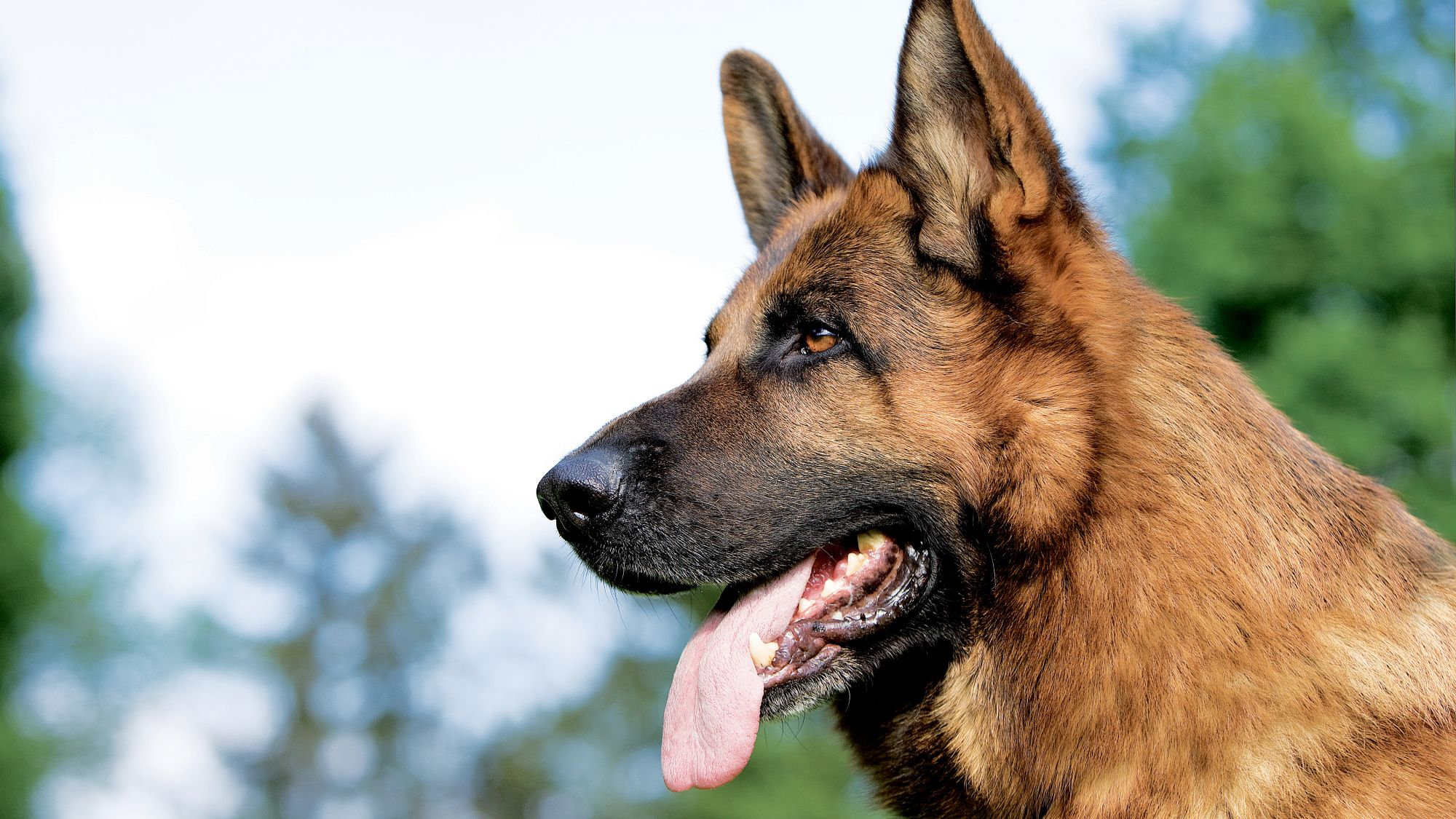
Get to know German Shepherd
All you need to know about the breed
An intelligent, lively, and steadfast breed, the German Shepherd fulfills so much that’s wanted in a dog. Devoted to their owner and to their family, this is a dog who will follow you from room to room, into the car, really anywhere you go.
The energy level of the German Shepherd? High. But that can also equate to fun, as the breed looks upon any activity as welcome activity. Walking, running, all work for the German Shepherd, as do tracking and agility competitions, which they excel at.
If there’s one characteristic that defines the German Shepherd, it’s their smarts. They are known for having incredibly high intelligence and the ability to figure things out - part of the reason, along with their faithful nature, that they’re often used by armed forces.
Because of their very high intelligence, the German Shepherd dog is also used widely as a service dog for disabled or visually impaired persons. They’re ideally suited for the role given their unwavering loyalty, intelligence, and keen sense of smell.
Train them well and this breed will return your requests in spades. As singularly self-assured as they are, the breed is also known to be a great companion dog. They are incredibly bonded to their owner, so teaching your German Shepherd won’t be hard, it just needs to be consistent.
The other breed hallmark: that coat! It’s a double one, and composed of thick, plush fur dappled with distinctive, rich colorings that give the German Shepherd breed their regal look.
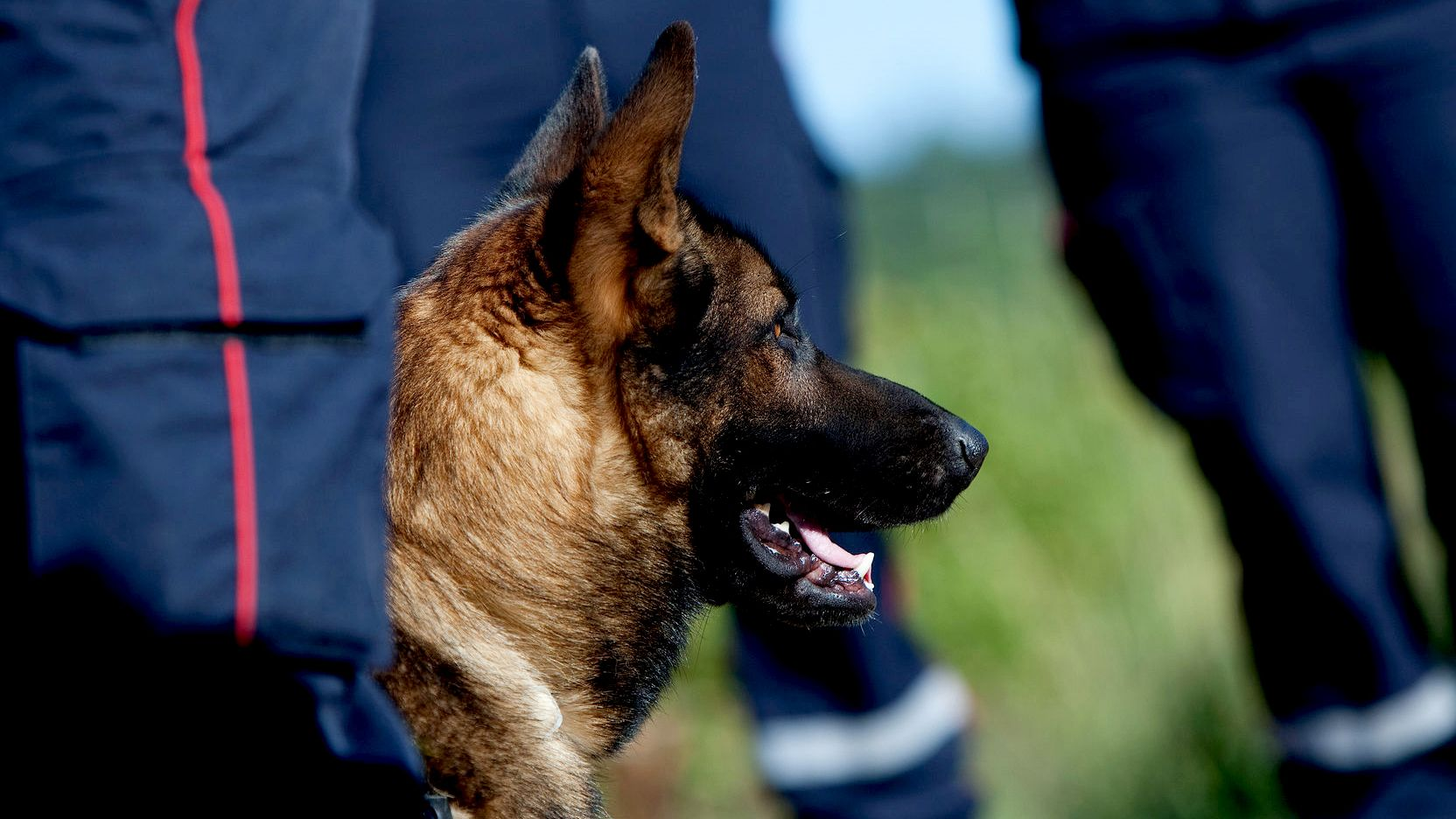
2 facts about German Shepherds
1. An incredible sense of smell
The German Shepherd breed is one of the leaders in olfactory abilities - that means sniffing. They are traditionally used to perform search and rescue, and for bomb and drug sniffing in police and military work because of this keen characteristic.
2. Speaking of noses...
Bred as a herding dog, the German Shepherd is known for rounding up not only other animals but even humans. They’ll nudge you with their nose - when they want to go out, go for a walk, or when it’s mealtime. It’s a charming and harmless trait, and could be handy where little ones are concerned as the German Shepherd tends to be highly protective, too.
History of the breed
Even-keeled and and loyal to a fault, the German Shepherd temperament reflects the careful breeding done by Captain Max Frederic Emile Von Stephanitz in Germany starting in 1899. Von Stephanitz wanted to produce a superior herding dog, particularly for sheep, so brought together sheepdogs in southern and central Germany. The goal was a dog with high intelligence and athletic ability. The “Shep-herd” was born.
Von Stephanitz then founded a club for the breed in Frankfurt in 1899. The breed developed a keen obedience in the ensuing years, becoming increasingly used for security, especially by the military and police, who still widely employ the German Shepherd today. And the public has joined their ranks: The German Shepherd gained huge popularity in the early Twentieth Century in the U.S. as a result of dog movie stars Rin-Tin-Tin and Strongheart. The breed is highly popular worldwide - in the top ten of U.S. breeds for the past ten years according to the American Kennel Club, and usually only second after the Labrador Retriever.
From head to tail
Physical characteristics of German Shepherds
1.Ears
2.Head
3.Fur
4.Body
5.Tail
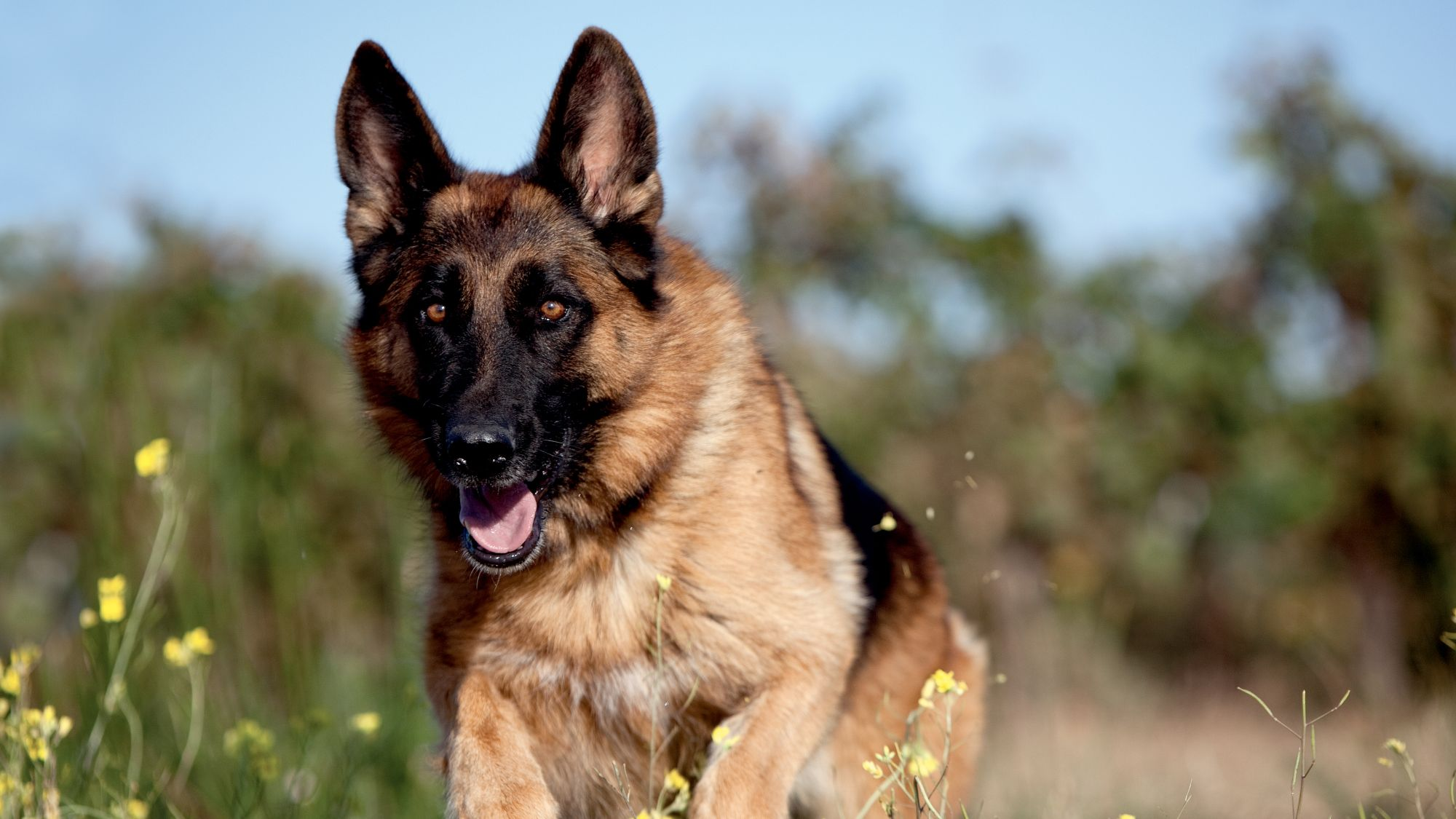
Things to look out for
From specific breed traits to a general health overview, here are some interesting facts about your German Shepherd
A strong breed with a sensitive stomach
When it comes to health, German Shepherds can have occasional bouts of digestive tract disorders and diarrhoea, not life-threatening but nonetheless no fun for the dog. Look for adverse reactions to food, diarrhoea or loose stool, gastroenteritis, pancreatic insufficiency, bloat, or IBD, among other disorders. Allergic dermatitis, or skin irritation, can also occur. Feeding your dog highly nutritious food will keep them on track. A proper diagnostic workup is mandatory, which can be time - and money - consuming. A good veterinarian can help you find solutions.
It’s those hips!
Hip dysplasia is the third top illness for the German Shepherd - in fact, they are predisposed. It is a developmental syndrome of the ball and socket joint where the thigh bone and the hip bone don’t quite conform. The result is arthritis. It’s important that the rate of growth, especially for large-breed dogs, stay constant so their bones and muscles develop together. Dysplasia can happen more often when muscles grow faster, thus putting stress on bones and joints, potentially causing arthritis and then dysplasia. A simple veterinarian check for your German Shepherd can find signs of any occurence.
Energy to burn
Forewarned is forearmed: The German Shepherd dog is an extremely high energy breed. It’s exciting to think about adding this gracious canine to your home, but they are not the breed for everyone. They thrive on a lot of daily exercise - so much so that the German Shepherd will easily accompany you on long runs, trotting alongside for hours.
Like all breeds however, the German Shepherd can suffer from health issues when some of their physical features are over-exaggerated, in their case, a sloped back. The feature came from developing the dog for shows, with a desire for an elegant line and shortened legs making a bouncy gait when the dog moved through the show ring. We advise you to seek counsel from your veterinarian where needed to always obtain a dog from a responsible breeder.
Healthy diet, healthier dog
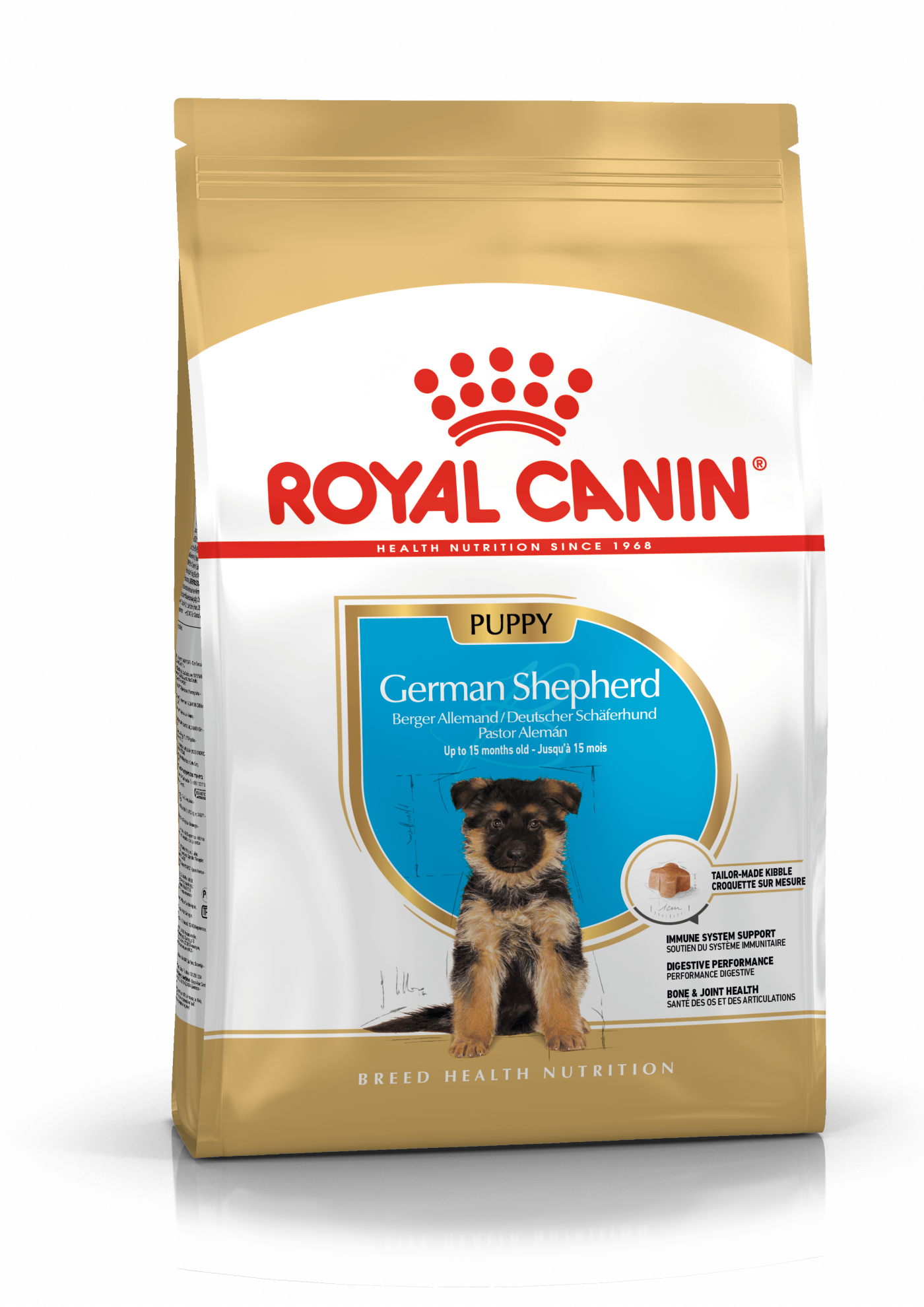
When choosing food for a German Shepherd, there are many factors to consider: their age, lifestyle, activity level, physiological condition, and health including potential sickness or sensitivities. Food provides energy to cover a dog’s vital functions, and a complete nutritional formula should contain an adjusted balance of nutrients to avoid any deficiency or excess in their diet, both of which could have adverse effects on the dog. Clean and fresh water should be available at all times to support good urinary regularity. In hot weather and especially when out exercising, bring water along for your dog’s frequent water breaks. Energy intake may also have to be adapted to the climatic conditions. A dog that lives outdoors in winter will have increased energy requirements. The following recommendations are for healthy animals. If your dog has health problems, please consult your veterinarian who will prescribe an exclusive veterinary diet.
A German Shepherd puppy’s requirements, in terms of energy, protein, minerals and vitamins, are much greater than those of an adult dog. They need energy and nutrients to maintain their body, but also to grow and build it. Until they are 15 months old, German Shepherd puppies’ immune system develops gradually. A complex of antioxidants - including vitamin E - can help support their natural defences during this time of big changes, discoveries, and new encounters. Their digestive functions are different from an adult German Shepherd’s, too: their digestive system is not mature yet so it is important to provide highly digestible proteins that will be effectively used. Mannan-oligosaccharides and prebiotics, such as fructo-oligosaccharides, support digestive health by balancing the intestinal flora, resulting in good stool quality.
It is important to choose a kibble with an appropriate size, shape, and texture. This growth phase also means moderate energy needs. Large-breed puppies, such as German Shepherd puppies, whose growth period is long and intense, are especially susceptible to skeletal and joint problems, including limb defects, bone deformities, and joint lesions. The first part of growth is mainly concerned with bone development, although the muscles also start to grow. This means that a puppy that eats too much - takes in too much energy - will put on too much weight and grow too quickly. This extra weight on the skeleton will increase the risk of bone deformity and joint problems, or dysplasia. Limiting the energy concentration of a food for German Shepherd puppies and feeding a correct daily amount will help control the speed of growth and minimise these risks.
Concentrations of other nutrients should be higher than normal in a specially formulated growth food. Although the calcium content in the food needs to be increased, large-breed breed puppies are more sensitive to excessive calcium intake. It’s important to understand then that adding any ingredients to a complete food formulated for the growth phase is at best unnecessary and at worst dangerous for the animal, unless prescribed by a veterinarian. It is recommended to split the daily allowance into three meals a day until they are 6 months old, then to switch to two meals per day.
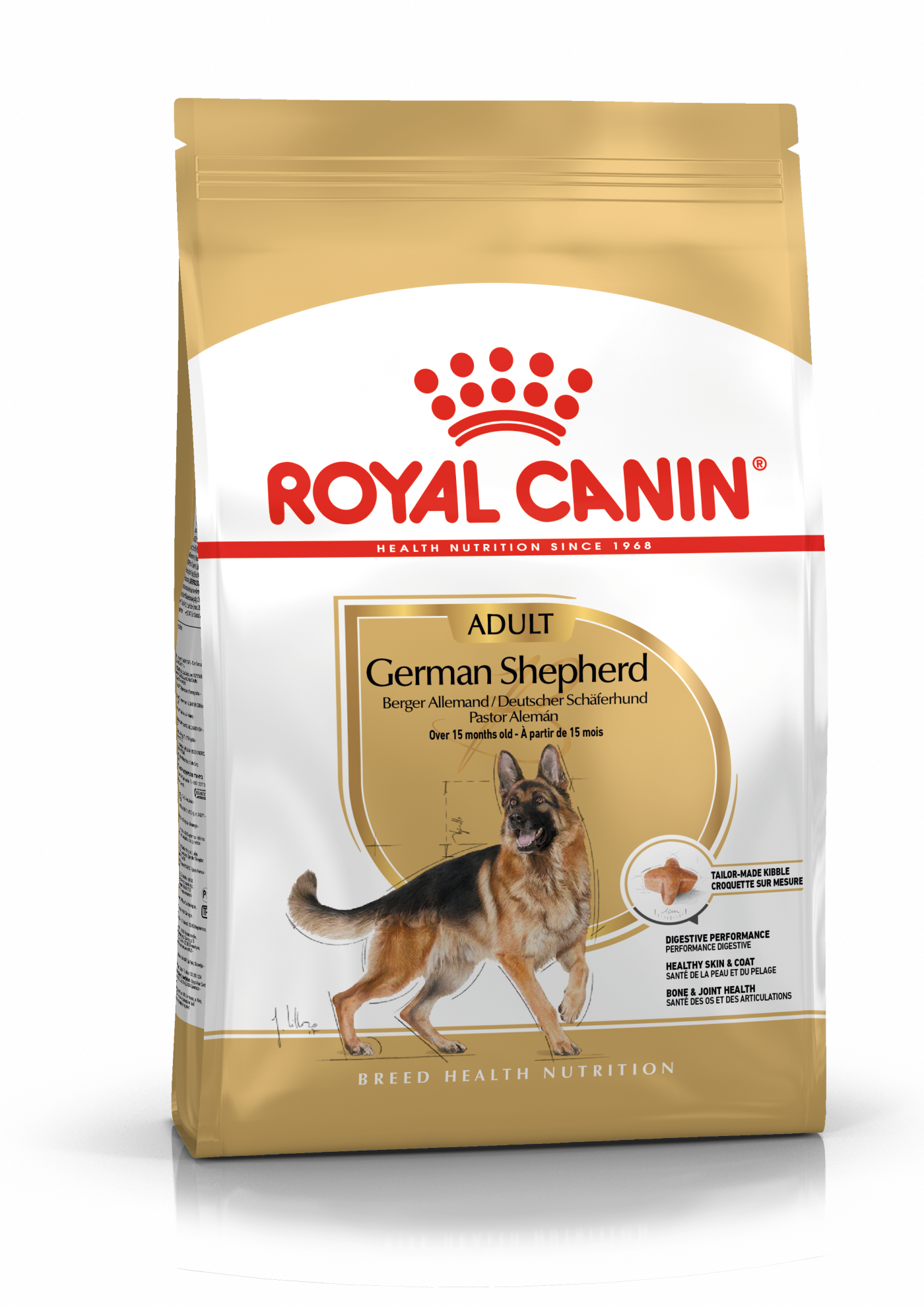
The main nutritional goals for adult German Shepherds are:
Promoting optimal digestibility with high quality protein and a selection of specific fibres to limit intestinal fermentation. This supports a balance in the intestinal flora and takes into account the German Shepherd’s digestive sensitivity.
Preserving the health and beauty of the skin and coat with the enriched provision of essential fatty acids (especially EPA-DHA), essential amino acids, and B vitamins in order to strengthen the skin’s “barrier” function
Helping to support the health of their bones and joints with glucosamine, chondroitin, and antioxidants.
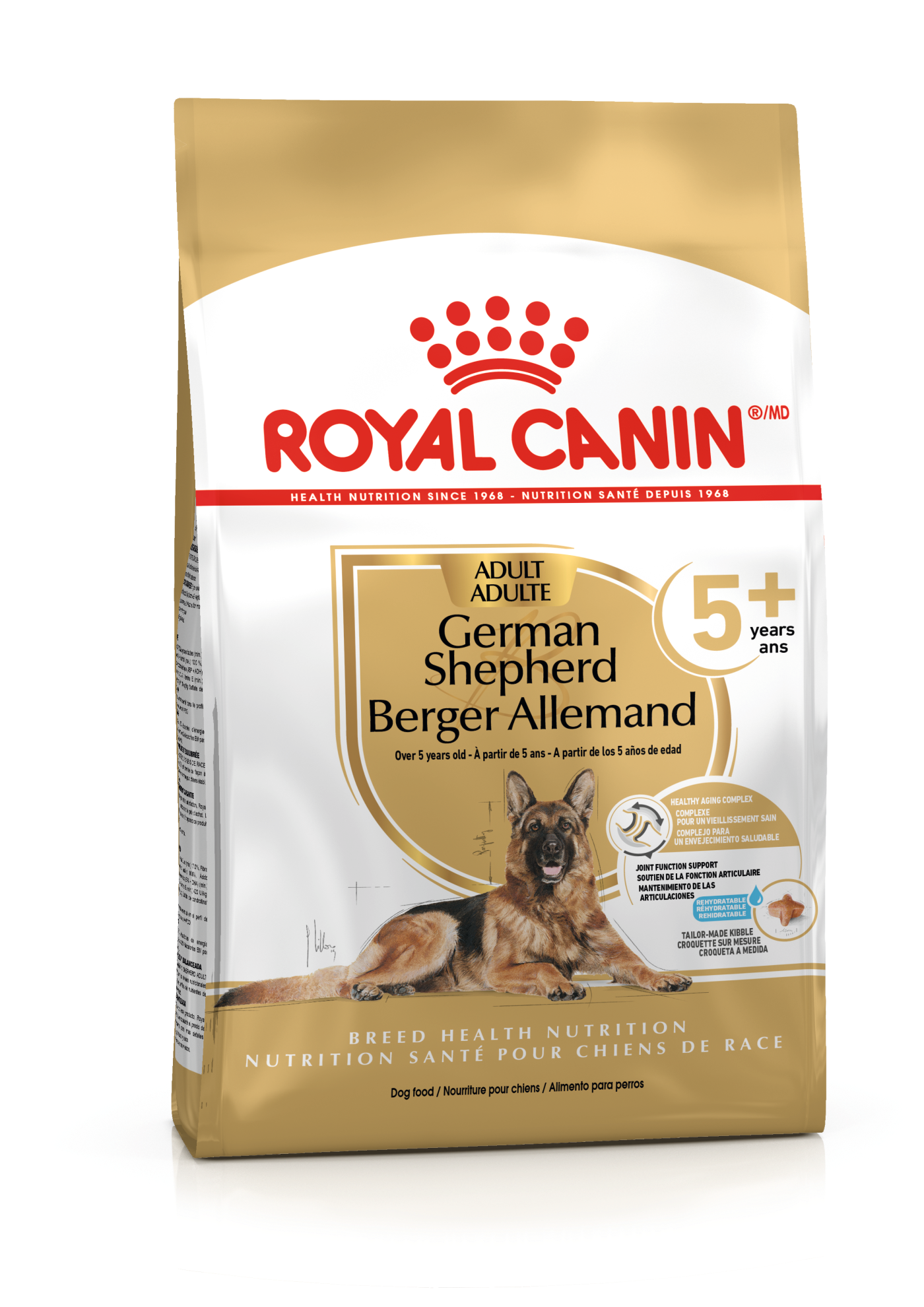
After 5 years old, German Shepherds will start facing the first signs of ageing. A formula enriched with antioxidants will help maintain their vitality, and specific nutrients, such as chondroitin, glucosamine, collagen, and EPA-DHA, will help maintain healthy bones and joints. Ageing is also accompanied by the modification of digestive capacities and particular nutritional requirements, so food for older German Shepherds should have the following characteristics:
Higher vitamin C and E content. These nutrients have antioxidant properties, helping to support the body’s cells against the harmful effects of the oxidative stress linked to ageing
High-quality protein. Contrary to a widely held misconception, lowering the protein content in food brings little benefit in limiting kidney failure. On top of it, older dogs are less efficient at using dietary protein than younger dogs. Reducing the phosphorus content is a good way of slowing down the gradual deterioration of kidney function
A higher proportion of the trace elements iron, zinc, and manganese to maintain good condition of the skin and coat.
A higher quantity of polyunsaturated fatty acids, like borage oil and fish oil, to maintain the quality of the coat. Dogs can normally produce these fatty acids, but ageing can affect this physiological process.
As they age, dogs increasingly suffer from teeth problems. To ensure they continue to eat in sufficient quantities, the size, shape, and texture of their kibble needs to be tailored to their jaw.
Throughout their life, it is important to avoid feeding German Shepherd human foods or fatty snacks. Instead, reward them with kibble taken from their daily meal allowance, and strictly follow the feeding guidelines written on the package in order to prevent excessive weight gain.
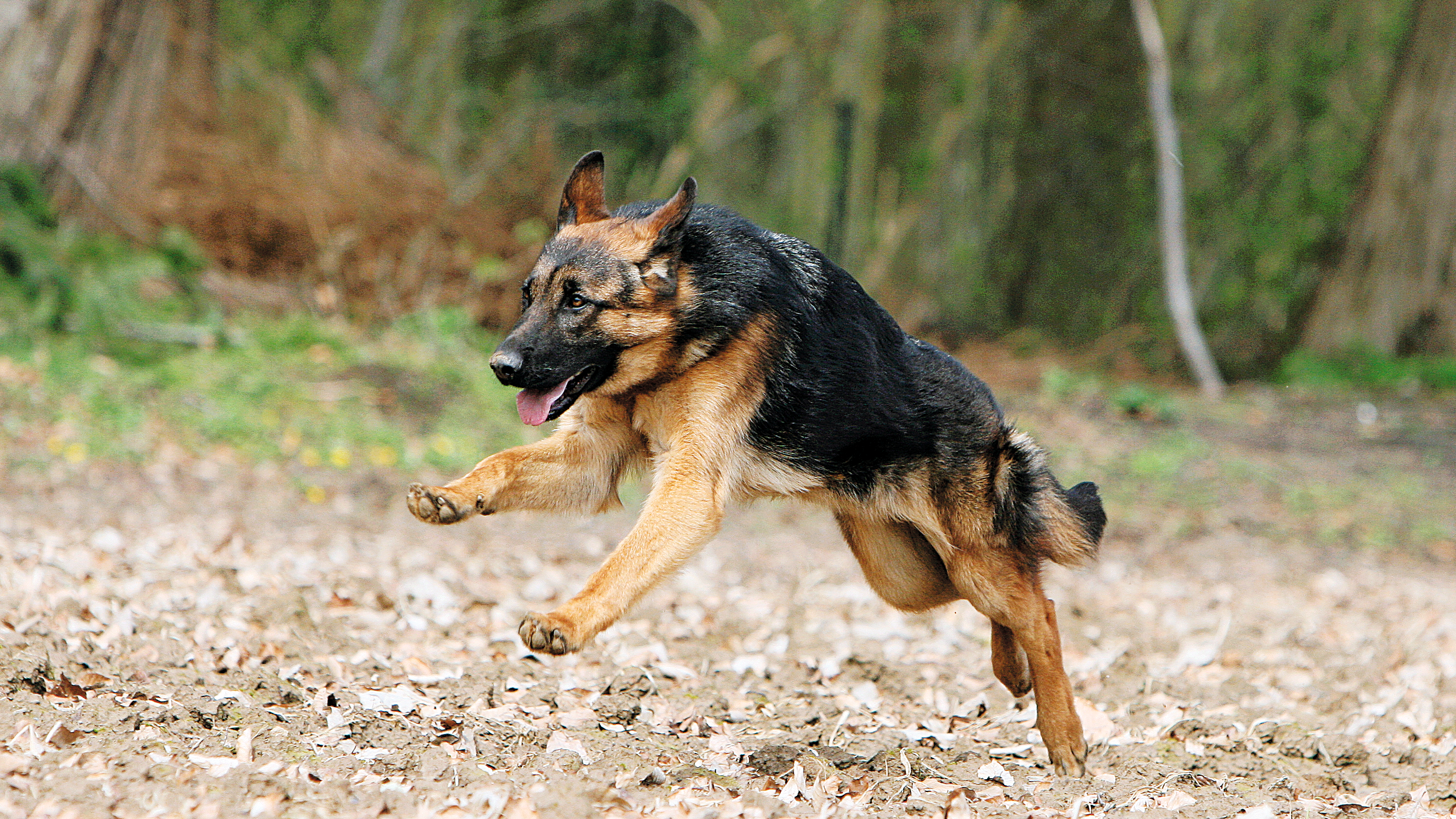
Caring for your German Shepherd
Grooming, training and exercise tips
German Shepherds and exercise go hand-in-hand. They require a large amount of daily activity as a highly athletic and high-functioning dog. Great runners - alone or with humans - they can go long distances. Herding, tracking, or agility exercises are also excellent for the breed who is often a competitor in these kinds of contests, not to mention working dog competitions and dog shows of all kinds.
German Shepherds have a double coat - a slightly thick coarse outer coat with a soft undercoat. Brushing twice a week is best. Despite their high athleticism, German Shepherds don’t need baths too often. Typically, long-haired breeds do shed, but less so if brushed regularly. Shedding will happen twice a year, to make way for the new fur. Nail trims should be done monthly however a dog that walks on hard surfaces will rub down his nails and subsequently they won't need clipping as frequently.
A highly trainable breed, German Shepherds have a personality that responds well to direction and commands. They very much want to please, and it’s no exaggeration to say they’re incredibly intelligent, a great combination when it comes to shaping them into a superb companion. It’s recommended to start training very early on, as German Shepherds are always in search of a task. They are highly bonded to their human family members.
7/7
All about German Shepherds
The breed makes an excellent family pet once trained since they are incredibly loyal and bonded to their people. The German Shepherd needs a job to do so responds well to commands. They are willing to go on walks or runs anytime, and tend to be very kid-friendly and protective. Their high intelligence makes them very obedient.
Not at all. German Shepherds are an affable breed and respond hugely well to any direction. This very active breed always wants to work so will never be bored - as long as you know how to keep them busy. They require a serious commitment from an active owner, but are a pleasure to have. Any health issues for your German Shepherd can be headed off with proper care.
Other breeds that might interest you
Read more on this topic
Sources
- Veterinary Centers of America https://vcahospitals.com/
- Royal Canin Dog Encyclopaedia. Ed 2010 and 2020
- Banfield Pet Hospital https://www.banfield.com/
- Royal Canin BHN Product Book
- American Kennel Club https://www.akc.org/
Like & share this page